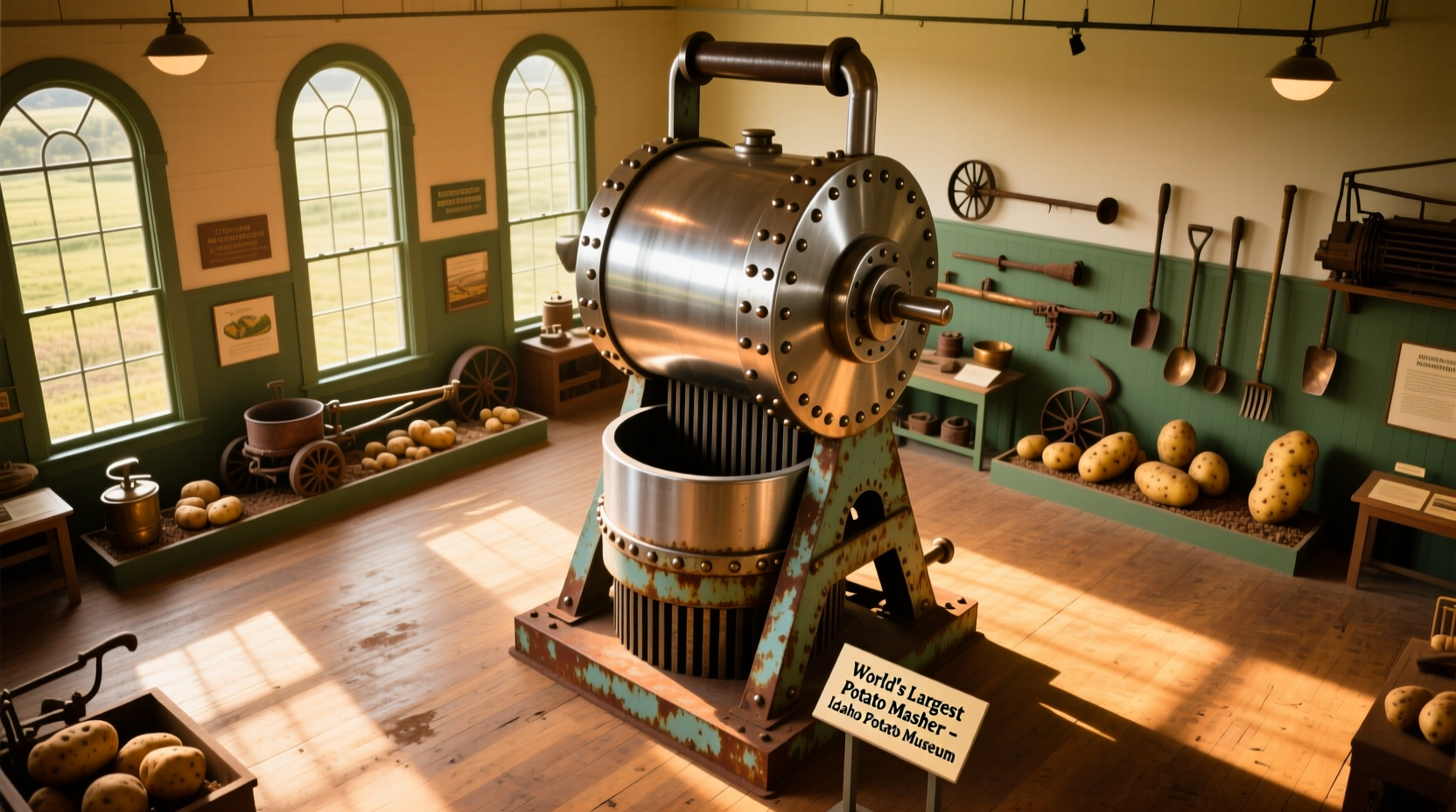The world's largest potato masher, officially recognized by Guinness World Records, measures 10 feet (3.05 meters) in length and was created by the Idaho Potato Commission in Boise, Idaho on September 18, 2010. This stainless steel culinary giant weighs approximately 1,500 pounds and is permanently displayed at the Idaho Potato Museum in Blackfoot, Idaho.
Ever wondered what it takes to mash potatoes for an entire town? The world's largest potato masher isn't just a novelty item—it represents a fascinating intersection of culinary tradition, engineering, and regional pride. In this article, we'll explore the impressive details behind this record-breaking kitchen tool, its creation story, and why such oversized culinary implements capture our imagination.
Meet the Record Holder: Specifications and Creation
When the Idaho Potato Commission decided to celebrate Idaho's potato heritage with a world record attempt, they didn't just think big—they thought giant. The commission worked with local metal fabricators to create a functional potato masher that would dwarf any kitchen tool you've ever seen.
Here's what makes this culinary behemoth stand out:
- Length: 10 feet (3.05 meters) from handle to mashing plate
- Weight: Approximately 1,500 pounds (680 kg)
- Material: Commercial-grade stainless steel
- Capacity: Can theoretically mash enough potatoes to serve 5,000 people
- Record date: September 18, 2010
- Current location: Idaho Potato Museum, Blackfoot, Idaho
Engineering a Culinary Giant: Design Challenges
Creating a functional potato masher at this scale presented unique engineering challenges that went far beyond simply "making everything bigger." The design team had to consider:
Structural integrity: Regular potato mashers rely on hand pressure, but at 10 feet long, leverage becomes a critical factor. The team reinforced the handle with internal steel supports to prevent bending during use.
Functional design: Unlike standard mashers that rely on wrist motion, this giant version requires a pulley system to operate safely. Museum staff use a rope and pulley mechanism to raise and lower the mashing plate.
Safety considerations: With a 1,500-pound implement, safety was paramount. The museum installed protective barriers and requires trained staff to operate the masher during demonstrations.
| Feature | Standard Potato Masher | World's Largest Potato Masher |
|---|---|---|
| Length | 8-12 inches | 120 inches (10 feet) |
| Weight | 4-8 ounces | 1,500 pounds |
| Capacity | 1-2 pounds of potatoes | Approx. 1,000 pounds of potatoes |
| Operation | Hand-powered | Pulley-assisted |
| Construction | Plastic or metal | Commercial stainless steel |
From Concept to Record: The Creation Timeline
The journey to create the world's largest potato masher followed a carefully planned timeline that demonstrates the complexity behind such a seemingly simple kitchen tool:
- January 2010: Idaho Potato Commission approves concept for world record attempt
- March 2010: Design phase begins with local engineering firm
- June 2010: Material sourcing and fabrication start
- August 2010: Final assembly and safety testing completed
- September 18, 2010: Official record attempt and verification
- October 2010: Permanent installation at Idaho Potato Museum
The record verification process required meticulous documentation. According to Guinness World Records guidelines, the commission had to provide:
- Multiple high-resolution photographs from different angles
- Video documentation of the masher in operation
- Notarized measurements by a certified surveyor
- Witness statements from independent observers
- Technical drawings showing construction details
Practical Limitations of Oversized Kitchen Tools
While the world's largest potato masher makes for an impressive display, it highlights important context boundaries for oversized kitchen implements. Unlike regular kitchen tools designed for daily use, record-breaking versions face significant practical limitations:
Functionality constraints: The giant masher requires a specialized setup with a 5-foot diameter pot and pulley system. It can't be used in standard kitchen environments and takes a team of four people to operate safely.
Maintenance challenges: Cleaning a 10-foot stainless steel implement requires industrial equipment. The museum uses a custom-built washing station rather than standard kitchen sinks.
Material considerations: Regular potato mashers use lightweight materials, but at this scale, the commission had to use 1/4-inch thick stainless steel to maintain structural integrity—making it 300 times heavier than a standard masher.
According to the Idaho Potato Museum's curator, "While it's fully functional, we only operate the giant masher during special events. The practical reality is that it's primarily an educational display that helps us tell the story of Idaho's potato industry."
Where to See It: Visitor Information
Located at the Idaho Potato Museum in Blackfoot, Idaho (the self-proclaimed "Potato Capital of the World"), the giant potato masher is part of the museum's permanent collection. Visitors can:
- View the masher up close in the main exhibition hall
- Watch scheduled demonstrations (typically held on weekends)
- Learn about Idaho's potato farming history through interactive exhibits
- Take photos with the masher (staff will provide a "giant" potato prop)
The museum receives approximately 25,000 visitors annually, with the giant potato masher consistently ranking as one of the top three most popular exhibits. School groups particularly enjoy the "Potato Power" educational program that uses the giant masher to demonstrate principles of leverage and simple machines.

Other Notable Oversized Kitchen Records
The world's largest potato masher exists within a broader context of oversized kitchen tool records. Some related Guinness World Records include:
- Largest frying pan (measuring 15 feet in diameter, created in Spain)
- Longest chef's knife (17 feet, made in Japan)
- Largest wooden spoon (12 feet tall, displayed in Canada)
- Biggest rolling pin (8 feet long, created in Germany)
What makes the potato masher record particularly interesting is that it's one of the few oversized kitchen tools that remains fully functional. Many record-breaking kitchen items are purely decorative, but Idaho's masher can still perform its intended purpose—albeit with significant logistical requirements.
Why Build a Giant Potato Masher? Cultural Significance
Beyond the novelty factor, the world's largest potato masher serves important cultural and educational purposes:
Economic storytelling: Idaho produces approximately one-third of all potatoes grown in the United States. The giant masher helps tell the story of how potatoes contribute $5.8 billion annually to Idaho's economy.
Educational value: The museum uses the masher to teach visitors about agricultural engineering, food science, and regional history. School programs incorporate the masher into lessons about simple machines and food production.
Tourism impact: Since its installation, the Idaho Potato Museum has seen a 35% increase in visitors, demonstrating how unique attractions can boost regional tourism. The masher has been featured in numerous travel publications and food documentaries.
As noted by agricultural historian Dr. James Peterson in his book Culinary Landmarks, "Giant food-related structures serve as modern-day monuments to our agricultural heritage, transforming everyday objects into symbols of regional pride and identity."











 浙公网安备
33010002000092号
浙公网安备
33010002000092号 浙B2-20120091-4
浙B2-20120091-4